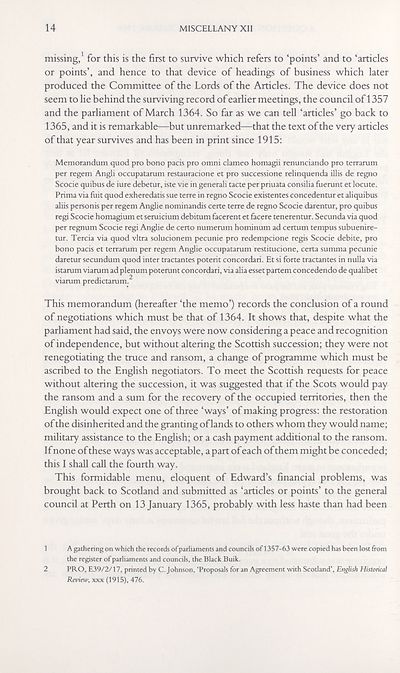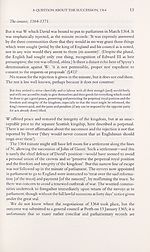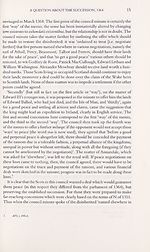Series 5 > Miscellany of the Scottish History Society, Volume 12
(25) Page 14
Download files
Complete book:
Individual page:
Thumbnail gallery: Grid view | List view

14
MISCELLANY XII
missing,1 for this is the first to survive which refers to ‘points’ and to ‘articles
or points’, and hence to that device of headings of business which later
produced the Committee of the Lords of the Articles. The device does not
seem to lie behind the surviving record of earlier meetings, the council of 1357
and the parliament of March 1364. So far as we can tell ‘articles’ go back to
1365, and it is remarkable—but unremarked—that the text of the very articles
of that year survives and has been in print since 1915:
Memorandum quod pro bono pads pro omni clameo homagii renundando pro terrarum
per regem Angli occupatarum restauradone et pro successione relinquenda illis de regno
Scode quibus de iure debetur, iste vie in generali tacte per priuata consilia fuerunt et locute.
Prima via fuit quod exheredatis sue terre in regno Scocie existentes concedentur et aliquibus
aliis personis per regem Anglic nominandis certe terre de regno Scocie darentur, pro quibus
regi Scocie homagium et seruicium debitum facerent et facere tenerentur. Secunda via quod
per regnum Scocie regi Anglie de certo numerum hominum ad certum tempus subuenire-
tur. Tercia via quod vltra solucionem pecunie pro redempcione regis Scocie debite, pro
bono pacis et terrarum per regem Anglie occupatarum restitucione, certa summa pecunie
daretur secundum quod inter tractantes poterit concordari. Et si forte tractantes in nulla via
istarum viarum ad plenum poterunt concordari, via alia esset partem concedendo de qualibet
viarum predictarum.2
This memorandum (hereafter ‘the memo’) records the conclusion of a round
of negotiations which must be that of 1364. It shows that, despite what the
parliament had said, the envoys were now considering a peace and recognition
of independence, but without altering the Scottish succession; they were not
renegotiating the truce and ransom, a change of programme which must be
ascribed to the English negotiators. To meet the Scottish requests for peace
without altering the succession, it was suggested that if the Scots would pay
the ransom and a sum for the recovery of the occupied territories, then the
English would expect one of three ‘ways’ of making progress: the restoration
of the disinherited and the granting of lands to others whom they would name;
military assistance to the English; or a cash payment additional to the ransom.
If none of these ways was acceptable, a part of each of them might be conceded;
this I shall call the fourth way.
This formidable menu, eloquent of Edward’s financial problems, was
brought back to Scotland and submitted as ‘articles or points’ to the general
council at Perth on 13 January 1365, probably with less haste than had been
1 A gathering on which the records of parliaments and councils of1357-63 were copied has been lost from
the register of parliaments and councils, the Black Buik.
2 PRO, E39/2/17, printed by C. Johnson, ‘Proposals for an Agreement with Scodand’, English Historical
Review, xxx (1915), 476.
MISCELLANY XII
missing,1 for this is the first to survive which refers to ‘points’ and to ‘articles
or points’, and hence to that device of headings of business which later
produced the Committee of the Lords of the Articles. The device does not
seem to lie behind the surviving record of earlier meetings, the council of 1357
and the parliament of March 1364. So far as we can tell ‘articles’ go back to
1365, and it is remarkable—but unremarked—that the text of the very articles
of that year survives and has been in print since 1915:
Memorandum quod pro bono pads pro omni clameo homagii renundando pro terrarum
per regem Angli occupatarum restauradone et pro successione relinquenda illis de regno
Scode quibus de iure debetur, iste vie in generali tacte per priuata consilia fuerunt et locute.
Prima via fuit quod exheredatis sue terre in regno Scocie existentes concedentur et aliquibus
aliis personis per regem Anglic nominandis certe terre de regno Scocie darentur, pro quibus
regi Scocie homagium et seruicium debitum facerent et facere tenerentur. Secunda via quod
per regnum Scocie regi Anglie de certo numerum hominum ad certum tempus subuenire-
tur. Tercia via quod vltra solucionem pecunie pro redempcione regis Scocie debite, pro
bono pacis et terrarum per regem Anglie occupatarum restitucione, certa summa pecunie
daretur secundum quod inter tractantes poterit concordari. Et si forte tractantes in nulla via
istarum viarum ad plenum poterunt concordari, via alia esset partem concedendo de qualibet
viarum predictarum.2
This memorandum (hereafter ‘the memo’) records the conclusion of a round
of negotiations which must be that of 1364. It shows that, despite what the
parliament had said, the envoys were now considering a peace and recognition
of independence, but without altering the Scottish succession; they were not
renegotiating the truce and ransom, a change of programme which must be
ascribed to the English negotiators. To meet the Scottish requests for peace
without altering the succession, it was suggested that if the Scots would pay
the ransom and a sum for the recovery of the occupied territories, then the
English would expect one of three ‘ways’ of making progress: the restoration
of the disinherited and the granting of lands to others whom they would name;
military assistance to the English; or a cash payment additional to the ransom.
If none of these ways was acceptable, a part of each of them might be conceded;
this I shall call the fourth way.
This formidable menu, eloquent of Edward’s financial problems, was
brought back to Scotland and submitted as ‘articles or points’ to the general
council at Perth on 13 January 1365, probably with less haste than had been
1 A gathering on which the records of parliaments and councils of1357-63 were copied has been lost from
the register of parliaments and councils, the Black Buik.
2 PRO, E39/2/17, printed by C. Johnson, ‘Proposals for an Agreement with Scodand’, English Historical
Review, xxx (1915), 476.
Set display mode to:
![]() Universal Viewer |
Universal Viewer | ![]() Mirador |
Large image | Transcription
Mirador |
Large image | Transcription
Images and transcriptions on this page, including medium image downloads, may be used under the Creative Commons Attribution 4.0 International Licence unless otherwise stated. ![]()
| Scottish History Society volumes > Series 5 > Miscellany of the Scottish History Society, Volume 12 > (25) Page 14 |
|---|
| Permanent URL | https://digital.nls.uk/127339101 |
|---|
| Description | Over 180 volumes, published by the Scottish History Society, containing original sources on Scotland's history and people. With a wide range of subjects, the books collectively cover all periods from the 12th to 20th centuries, and reflect changing trends in Scottish history. Sources are accompanied by scholarly interpretation, references and bibliographies. Volumes are usually published annually, and more digitised volumes will be added as they become available. |
|---|


